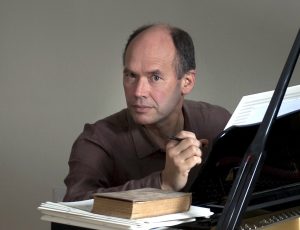 Willem Wander van Nieuwkerk, born in Amsterdam in 1955 to a Dutch father and a Dutch-Indonesian mother. Composer and long-time lecturer in New Music at the Amsterdam Conservatory. As a musicologist, he specialised in 20th-century music and music aesthetics, as a pianist, in improvised music, jazz and modern music.
Willem Wander van Nieuwkerk, born in Amsterdam in 1955 to a Dutch father and a Dutch-Indonesian mother. Composer and long-time lecturer in New Music at the Amsterdam Conservatory. As a musicologist, he specialised in 20th-century music and music aesthetics, as a pianist, in improvised music, jazz and modern music.
Initially, he worked with his own ensembles of pop and classical musicians in full-length, theatrical compositions: Debris, Soli from 1982-83, a mixture of punk, reggae, new music and experimental pop music, and the 1985 experimental dance opera First Things First, for electric guitars, dancers, vocals and percussion.
Early Music was also a love of his; in collaboration with musicians specialising in it, he created recorder compositions that were frequently played ever since. Pieces like So Tear, The Party, Kadanza, and Bye bye, blues (C-U, Jesus) attracted international attention because, in a contemporary, highly melodic idiom, they combine classical forms and the timbre of Early Music with recognisable idioms from pop music and folk music from all over the world.
The enthusiastically received CD Kadanza contains his music with recorder from 1985 – 2015 played by the best ensembles of the period, such as Brisk, Loekie Stardust, the Flanders Recorder Quartet and la Fontegara Amsterdam.
He also wrote commissioned music for the Dutch Senate, the Swiss National Celebration, the University of Amsterdam, Margess International, Stichting Utrechts Requiem, and for film, theatre, and dance productions.
Starting with the piano quintet T’Andernaken (2003), historical borrowings and references take on an increasingly important role. In chamber-musical, solistically written works, he builds on the lyricism of traditional sources such as the Antwerp Liedboek, the Geneva Psalter and the Gregorian tradition. Classical forms and stylistic elements are the guiding principles, and contemporary rhythms are a striking feature.
For instance, the seven-movement Super Suite is a large, contemporary variation on historical chants and hymns, from Luther’s Mitten wir im Leben sind to Ave Maris Stella. The violin sonata Deep River explores the original, nineteenth-century version of the well-known spiritual. Historically panoramic is Songs of War & Peace for recorder and string quartet, set to Dutch, German and Bohemian folk music from the Thirty Years’ War with borrowings from Schütz and Biber to Brahms and Dvorak.
He has collaborated with the Utrecht String Quartet, Lisa Jacobs (The Amsterdam Soloists), Celeste Zewald (Trio Amare), Bas Verheijden (The Atlantic Trio), Nancy Braithwaite (the Bartók Trio, Arto Ensemble), the Škampa Quartet, the Bennewitz Quartet and Harry-Imre Dijkstra, the Ruysdael Quartet and Peter Holtslag, Camerata Trajectina, Alexander Pavlovsky, Rosanne Philippens and Thomas Beijer, among others.
For Thomas Beijer, he wrote the three-movement A Pilgrim’s Progress, based on the Llibre Vermell.
Saskia Coolen (recorder), Rainer Zipperling and Patrick Ayrton will premiere his Rameau-inspired suite L’Europe des Amants in November 2024, which will be part of their new CD of French music The Burgundy Project.
Van Nieuwkerk taught New Music, chamber music and aesthetics at the Conservatorium van Amsterdam for over 35 years. He published on New Classicism in the Dutch Journal of Music Theory, among others, and wrote a contribution on music and sonic art for the collection of music philosophical essays Which language does music speak (Damon, 2006).
He is happily married and has two children, Yuri and Mascha.